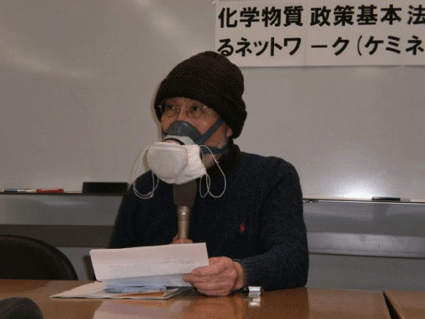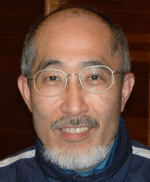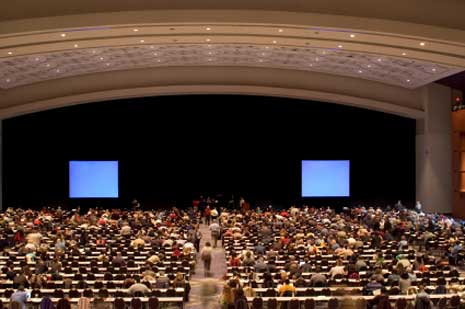
The author, Ryozo Tamakoshi is a member of the Japanese organization CACP – Citizens Against Chemicals Pollution.
On February 22, 2010, a conference called “The 1st Meeting for Learning Chemical Policies for Enacting a Basic Chemical Law” was held in the House of Representatives in Tokyo. In view of his chemical and electromagnetic sensitivities, Ryozo Tamakoshi gave a lecture on MCS. This was a matter of particular concern for him, as his health troubles were caused by chemical exposure. The conference focused on the topic ‘Security of Chemicals’ and the need to create a new policy for more careful handling of chemicals – important basic principles for all the Japanese people who have to live with MCS.
Talk of Ryozo Tamakoshi / Citizens Against Chemicals Pollution
 As a patient with multiple chemical sensitivity, I must share with you some important things.
As a patient with multiple chemical sensitivity, I must share with you some important things.
I have multiple chemical sensitivity and electromagnetic sensitivity. The onset of multiple chemical sensitivity begins differently among individuals as do the corresponding symptoms. In my case, I gradually became chemically sensitive. I think my symptoms are relatively mild compared to others with this condition. Some patients are seriously compromised and can hardly leave their homes to participate in a meeting like this one. I have some risks going out in public, but think it my duty as one who can actually attend a meeting like this one, to enlighten others regarding this condition called multiple chemical sensitivity or MCS. Therefore, I would like to express my gratitude for your allowing me the opportunity to speak to you today. Thank you. I would like to discuss seven points. As you listen, please consider that my findings are based on personal experiences.
1. One cause of multiple chemical sensitivity is the toxic effect of extremely low levels of chemical substances.
On October 1, 2009 in Japan, the Medical Information System Development Center (MEDIS-DC) – a subsidiary organization of the Ministry of Health, Labor and Welfare (MHLW) – registered “multiple chemical sensitivity” as “ICD-10 Japanese standard disease master”. Multiple chemical sensitivity was classified in Japan into ICD-10 code T65.9 – “Toxic effect of unspecified substance, Poisoning NOS”.
Please look at the following material (1)(2).
From these references, it is well understood that multiple chemical sensitivity is classified into “Toxic effect of substance”
(1) T65.9 ICD-10 WHO
Chapter XIX: Injury, poisoning and certain other consequences of external causes (S00-T98)
T51-T65: Toxic effects of substances chiefly non-medicinal as to source
T65 Toxic effect of other and unspecified substances
T65.9: Toxic effect of unspecified substance Poisoning NOS
(2) The Japanese name of diseases classified into “ICD10 code T65.9″
The Japanese name of diseases
- multiple chemical sensitivity
- systemic poisoning
- poisoning
- accidental poison ingestion
- attempted suicide by taking poison
In Japan, it is clearly thought that the cause of multiple chemical sensitivity is a “Toxic effect of chemical substances” . And frankly speaking, this means that if there were no chemicals which had toxic effects, people wouldn’t become chemically sensitive.
As you can see, I cannot live without a double gas mask now. (VOC mask and activated carbon mask) Especially in winter, I cannot take this mask off even when I sleep at night because the heating machine in the nearby greenhouse operates at night and gases are released. The manufacturer of the heating machine writes in the catalog on the internet as follows, “Flue gases are extremely harmful to human health and crops. Please be sure to release them outdoors”. Why is it allowed to release such harmful gases outdoors?
My biggest fear in winter has been these gases. When the gases are released, suddenly I smell burning, start coughing, phlegm occurs, and my eyes become painful. Furthermore, my mouth becomes bitter, I have tongue numbness, and I feel poisoning (discomfort) of the internal organs, especially to the digestive organs. Then, I have strong fatigue throughout my body so I lie on the floor and sleep eventually.
I cannot prevent the bad influence of these gases now, even if I have on a gas mask and use air purifiers in my home. When my house is in the upwind side of the greenhouse, I am relatively safe. But when I am downwind, I am always pushed into the hell. To avoid these gases, I often sleep in my car, away from my house, or sometimes in a rice field or on a mountain. This is just one example of the difficulties I face with multiple chemical sensitivity.
For me, the current world, no matter where I live and go, is a toxic or poisonous world. The toxicity of substances at the level of ppm and ppb has a big influence on my health. My daily health disorders due to the exposure of many harmful chemicals cannot be simply explained by an allergic reaction any longer. The doctors who examined my symptoms only from the perspective of immune disorder failed to make proper diagnosis of my symptoms.
I think that it is impossible to understand the essence of multiple chemical sensitivity without focusing on the complexity of many chemical toxicities and patients’ symptoms.
I do not use the word “poison” (toxic effect) emotionally. I only use the word “poison” (toxic effect) to explain daily, normal phenomena, because I cannot live without a gas mask.
2. The reality of multiple chemical sensitivity is the result of complex toxic effects of many chemicals and it is spreading out all over the world.
Modern society is full of so many chemicals. Life without chemicals is no longer a possibility. Of course there exist many chemicals with toxic effects. We are living with the complex pollution of them. New chemicals have been produced one after another without enough consideration of the influence of chemicals on ecosystems and without confirming whether those are safe for human beings and creatures. Thus, the “toxic world” has been spread globally.
I have been in contact, via the internet, with international patients who have multiple chemical sensitivity and environmental illness. I have come across sorrowful cries of patients, warm words of empathy to comfort one another, and powerful protests and demands against our “toxic world”. Moreover, I’ve received a lot of essential information about MCS and environmental illness which is reported on the internet to the entire world. Complex chemical pollution has now spread out all over the world.
3. Multiple chemical sensitivity cannot be separated from other developmental and chronic multisystem illnesses caused by the environment.
Multiple chemical sensitivity cannot be separated from other environmental illnesses such as sick building syndrome, allergic diseases and electromagnetic hypersensitivity. We must not only focus on the chemical pollutants, but must also look at other environmental factors such as biological infectious agents and electromagnetic fields. Many patients with MCS also have allergic diseases and electromagnetic hypersensitivity. This condition is a complex one.
Consider expanding your perspective on developmental disorders. In Japan, developmental disorders mean a pervasive developmental disorder, high-functioning autism, Asperger syndrome, a learning disorder (dyslexia) or attention deficit hyperactivity disorder (ADHD), etc. Currently, there are a lot of research papers detailing that environmental factors (chemicals) may cause the appearance of those developmental disorders. The increasing number of these reports is more and more available.
I have been supporting two children with developmental disorders at home while considering chemical pollution as the cause of these types of disorders. People around them don’t understand them, which gives the children worries and suffering. Their situation seems to be similar to ours. Supporting their study is my pleasure.
4. Some common effects can be seen in MCS, but each person has different symptoms. Therefore, there are various difficulties and disabilities due to MCS. Comprehensive supports are needed for the various difficulties and disabilities.
I think it very important to understand the individual symptoms in connection with various difficulties and disabilities in life. I strongly wish industrial accident authorization and disability authorization would reflect precisely the situation of the patient and be performed promptly. It is positive that industrial accident authorization and disability authorization of MCS have been actually recognized in Japan. However, the form of documents for disability authorization is partly inappropriate, so the paperwork can’t be filled out precisely. I think the forms and documents should be immediately edited and improved.
Guaranteed rights of medical care, welfare, labor, housing and pension corresponding to the state of every person are written in Japan’s Constitution.
5. To protect patient’s lives and health, to treat symptoms, and to recover health, should be top priority, in addition to avoiding exposure to toxic substances and ensuring safe and secure places to live.
For patients with MCS, the most important thing is to avoid exposure of toxic substances.
In particular, ensuring emergency evacuation of patients has become an urgent issue.
But it is very difficult to secure a safe place by one’s own effort. To reduce a heavy personal burden, some support by the authorities is absolutely necessary for the patient. In addition, it should be emphasized to make available all correct information about harmful chemicals to all citizens.
6. We have a serious problem. We are often attacked by the feeling of isolation, loneliness, anxiety, fear, and helplessness.
This is one of the most serious and important problems. MCS patients around the world, just like us, worry and suffer. Sadly, there are still some people who commit suicide in despair. When people around me, including my family, can’t understand my physical and mental state, I have a terrible feeling of loneliness.
Continuous bad health conditions, anxiety and fear of a sudden chemical attack, and isolation from participation in society, leaves me with a feeling of helplessness and despair. To break this ongoing cycle, mutual support among friends and society is needed. The social recognition and the social support are absolutely necessary.
When exposed to toxic chemicals, I get irritated, impatient and sometimes get in a bad mood. I cannot smile. Unfortunately, these behaviors are not viewed as a result of the individual’s chemical poisoning but instead a problem with the individual’s heart, which is not the case. In order to prevent the unfortunate misunderstandings like these, it is very important that we spread correct information regarding this condition and strive for the recognition of MCS. We must support those who are apt to have low self-esteem and affirm those with chemical sensitivity so they may live freely in peace, and participate in society with more pride.
7. The eight basic principles of “Basic Law on Chemicals Policy” that ChemiNet has proposed should be respected.
All the basic principles listed below are very important.
The many problems regarding multiple chemical sensitivity will be solved fundamentally in the process of policy formulation and implementation of the comprehensive chemicals on these basic principles:
- Production and use of chemicals for a sustainable society (The reduction the amount of chemicals)
- No Data, No Market principles
- Consideration must be given to the people ( fetus / child) who are most vulnerable and also to the ecosystem
- Lifecycle management must be initiated (From research and development to production, use, recycling and disposal
- The precautionary principle must be respected
- Alternative principle must be initiated
- The participation of all people concerned. The collaboration principle must be implemented
- International cooperation must occur
Author: Ryozo Tamakoshi
Thanks to Christi and Larry for reading correction.
Related Articles about MCS in different countries:






